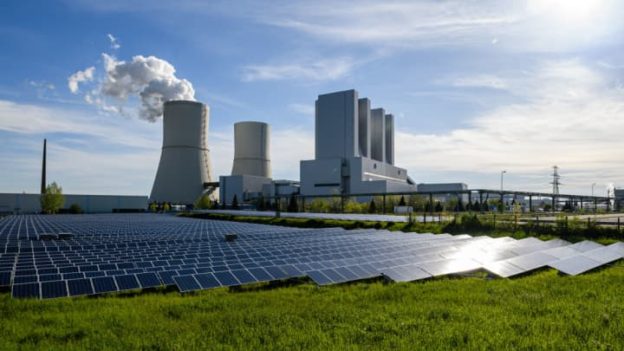- The Russian invasion of Ukraine and the EU’s dependence on Russian natural gas show that a diversification of energy supplies is critical to establishing energy security.
- At the same time, the latest Intergovernmental Panel on Climate Change’s report out on Monday notes that coal and fossil fuels are “choking humanity.”
- The confluence of these events spotlight a few key points about current global energy markets.
The Ukrainian people are bearing the heaviest weight of the war they are fighting with Russia, but the war has had grave consequences for global energy markets as well.
The European Union relies on Russian natural gas, and that dependence has forced the United States and Europe to, so far, maintain loopholes in their otherwise tough economic sanctions on Russia.
On Wednesday, White House spokesperson Jen Psaki indicated the Biden administration was considering energy sanctions on Russia, but that’s a very tough call in the face of high oil prices in both the U.S. and Europe.
The Russian-Ukrainian war is one wrench in global energy markets, and another is climate change. As Monday’s highly anticipated report from the U.N.’s Intergovernmental Panel on Climate Change made urgently and desperately clear, global warming is an urgent threat to human welfare.
“Nearly half of humanity is living in the danger zone – now. Many ecosystems are at the point of no return – now,” U.N. Secretary-General António Guterres said on Monday. “Unchecked carbon pollution is forcing the world’s most vulnerable on a frog march to destruction – now.”
Teetering on this precipice with climate change while simultaneously surviving the Russian and Ukraine war is generating a new framework for understanding the global energy markets.
Energy independence is not the same as energy security
A nation’s national energy policy is a cornerstone of its national security policy.
In Europe’s case, “it was staggeringly irresponsible to outsource gas storage to Gazprom,” said Steve Cicala from the National Bureau of Economic Research. Cicala focuses on the economics of regulation, and specifically on environmental and energy policy. Gazprom is the Russian energy giant that’s majority owned by the state.
Going forward, the EU “should be moving at the maximum possible speed to get themselves off of Russian gas,” Cicala said.
That does not mean energy independence is the benchmark.
“The goal is security,” said David Victor, a professor of public policy at UC San Diego. “And security is not the same thing as independence.”
Energy independence means relying on national or local sources of energy. But even there, flexibility is limited if one of those sources is interrupted or runs out. A well-functioning global market is a better solution.
“Security comes from diversity and diversity alone,” he said.
For Europe, being overly dependent on pipelines of Russian natural gas is the problem. The EU meets about 10% of its demand for natural gas domestically, and all the rest is imported, which makes it the largest importer of natural gas in the world, according to to the Directorate-General for Energy for the EU. Natural gas imported into the EU comes mainly from Russia (41%), Norway (24%) and Algeria (11%).
https://www.cnbc.com/amp/2022/03/02/russia-ukraine-war-lessons-for-global-energy-markets.html





